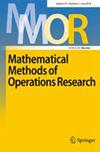Optimal stopping and impulse control in the presence of an anticipated regime switch
IF 1.2
4区 数学
Q3 MATHEMATICS, APPLIED
引用次数: 0
Abstract
Abstract We consider a class of stochastic optimal stopping and impulse control problems where the agent solving the problem anticipates that a regime switch will happen at a random time in the future. We assume that there are only two regimes, the regime switching time is exponentially distributed, the underlying stochastic process is a linear, regular, time-homogeneous diffusion in both regimes and the payoff may be regime-dependent. This is in contrast with most existing literature on the topic, where regime switching is modulated by a continuous-time Markov chain and the underlying process and payoff belong to the same parametric family in all regimes. We state a set of easily verifiable sufficient conditions under which the solutions to these problems are given by one-sided threshold strategies. We prove uniqueness of the thresholds and characterize them as solutions to certain algebraic equations. We also study how anticipation affects optimal policies i.e. we present various comparison results for problems with and without regime switching. It may happen that the anticipative value functions and optimal policies coincide with the usual ones even if the regime switching structure is non-trivial. We illustrate our results with practical examples.最优停止和脉冲控制,在存在预期的状态切换
摘要考虑一类随机最优停止和脉冲控制问题,其中求解问题的智能体预期在未来的随机时间将发生状态切换。我们假设只有两个制度,制度切换时间是指数分布的,潜在的随机过程是一个线性的,规则的,时间齐次的扩散在两个制度和收益可能是制度相关的。这与大多数关于该主题的现有文献形成对比,其中状态切换由连续时间马尔可夫链调制,并且在所有状态下潜在的过程和收益属于相同的参数族。我们提出了一组易于验证的充分条件,在这些条件下,这些问题的解是由单侧阈值策略给出的。我们证明了阈值的唯一性,并将其表征为某些代数方程的解。我们还研究了预期如何影响最优策略,即我们给出了有和没有状态切换问题的各种比较结果。即使在非平凡的制度转换结构下,预期价值函数和最优策略也可能与通常值函数和最优策略重合。我们用实例来说明我们的结果。
本文章由计算机程序翻译,如有差异,请以英文原文为准。
求助全文
约1分钟内获得全文
求助全文
来源期刊
CiteScore
1.90
自引率
0.00%
发文量
36
审稿时长
>12 weeks
期刊介绍:
This peer reviewed journal publishes original and high-quality articles on important mathematical and computational aspects of operations research, in particular in the areas of continuous and discrete mathematical optimization, stochastics, and game theory. Theoretically oriented papers are supposed to include explicit motivations of assumptions and results, while application oriented papers need to contain substantial mathematical contributions. Suggestions for algorithms should be accompanied with numerical evidence for their superiority over state-of-the-art methods. Articles must be of interest for a large audience in operations research, written in clear and correct English, and typeset in LaTeX. A special section contains invited tutorial papers on advanced mathematical or computational aspects of operations research, aiming at making such methodologies accessible for a wider audience.
All papers are refereed. The emphasis is on originality, quality, and importance.

 求助内容:
求助内容: 应助结果提醒方式:
应助结果提醒方式:


